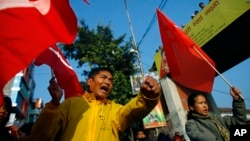NEW DELHI, INDIA —
In Nepal, an agreement to form an interim government headed by the supreme court chief justice has raised hopes of ending a political deadlock. The country’s fledgling democracy has been in limbo since last year.
After months of wrangling, Nepal’s four major political parties have decided to hold new elections under the supervision of a unity government headed by Supreme Court Justice Khilaraj Regmi.
Political parties say elections will probably be held in June to choose a new national assembly that will complete the task of drafting a democratic constitution.
The tiny Himalayan country has been governed by a Maoist-led caretaker government since last May, when parliament was dissolved after lawmakers were unable to decide on a new prime minister.
The failure of the country’s political parties to steer the country’s transition to democracy for the last five years has resulted in great public disillusionment.
Kunda Dixit, political commentator and editor of Nepali Times, says the situation worsened in the past year.
“It has got very, very embarrassing for the political parties," said Dixit. "There has been no budget. There is no development work, infrastructure, construction. Everything has come to a halt, except for a few day-to-day projects. There is no spending. Because of the instability, investors have been turned away - both domestic and foreign. That’s where the sense of urgency came, from the fact that nothing is moving and [everything is] stuck.”
Political analysts say there is a huge sense of relief that the country is moving ahead with the political process. However, concerns have been voiced that having the supreme court chief justice head the new government could compromise the independence of the judiciary.
But Kunda Dixit says Nepal was left with no option.
“The democratic parties had actually rejected this proposal in the beginning, saying that it would be anti-democratic, it would merge the executive and the judiciary and that would be detrimental to democracy. But in the end they came out with a compromise formula where the chief justice would not serve in the supreme court and just be a caretaker, interim leader government,” said Dixit.
Nepal held an election in 2008, after the monarchy was abolished. But hopes of turning the country into a full-fledged democracy have been paralyzed for nearly five years because of political wrangling as well as ethnic, socio-economic and regional differences.
After months of wrangling, Nepal’s four major political parties have decided to hold new elections under the supervision of a unity government headed by Supreme Court Justice Khilaraj Regmi.
Political parties say elections will probably be held in June to choose a new national assembly that will complete the task of drafting a democratic constitution.
The tiny Himalayan country has been governed by a Maoist-led caretaker government since last May, when parliament was dissolved after lawmakers were unable to decide on a new prime minister.
The failure of the country’s political parties to steer the country’s transition to democracy for the last five years has resulted in great public disillusionment.
Kunda Dixit, political commentator and editor of Nepali Times, says the situation worsened in the past year.
“It has got very, very embarrassing for the political parties," said Dixit. "There has been no budget. There is no development work, infrastructure, construction. Everything has come to a halt, except for a few day-to-day projects. There is no spending. Because of the instability, investors have been turned away - both domestic and foreign. That’s where the sense of urgency came, from the fact that nothing is moving and [everything is] stuck.”
Political analysts say there is a huge sense of relief that the country is moving ahead with the political process. However, concerns have been voiced that having the supreme court chief justice head the new government could compromise the independence of the judiciary.
But Kunda Dixit says Nepal was left with no option.
“The democratic parties had actually rejected this proposal in the beginning, saying that it would be anti-democratic, it would merge the executive and the judiciary and that would be detrimental to democracy. But in the end they came out with a compromise formula where the chief justice would not serve in the supreme court and just be a caretaker, interim leader government,” said Dixit.
Nepal held an election in 2008, after the monarchy was abolished. But hopes of turning the country into a full-fledged democracy have been paralyzed for nearly five years because of political wrangling as well as ethnic, socio-economic and regional differences.




